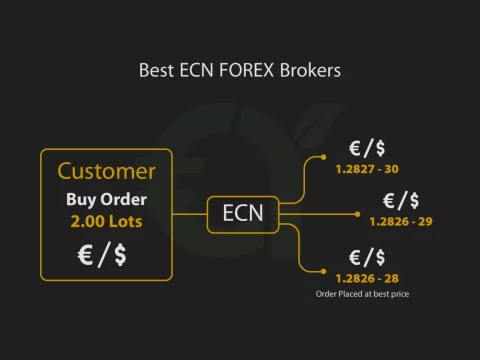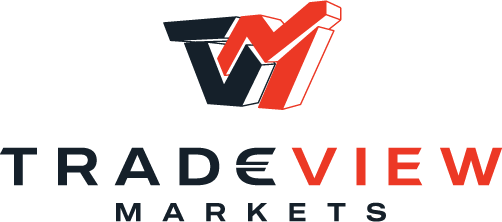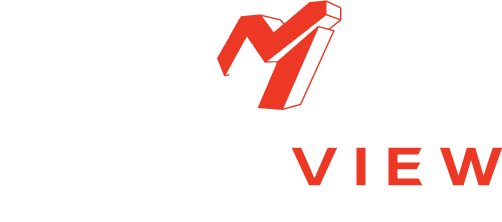7 Best ECN Brokers for 2024
2 years ago
FOREX Brokers
New FOREX traders at the start of their careers face the daunting question of what type of broker they will engage. There are several types of brokers in the market. They offer many distinct features, as well as types of accounts.
With the FOREX market accounting for six trillion dollars in trading daily, it offers traders the chance to successfully find the precise trading conditions they need. Key to such considerations is deciding between a standard account and an Electronic Communications Network (ECN) account. In this article, we will specifically explain what an ECN account includes and guide you on how to choose the best ECN broker for you.

Best ECN FOREX Brokers in 2024
We'll start by listing the best ECN FOREX brokers today. This collection of brokers is the result of a detailed review carried out by Arincen. We will share our review methodology at the end of the article so you can understand why we chose the companies we did.
| Company name | Regulations | Minimum deposit | Main branch | Open account |
|---|---|---|---|---|
 ICM Capital | 500$ | United Arab Emirates | ||
 Tradeview | 250$ | USA | ||
 XTB | 500$ | UK | ||
 IG | 500$ | UK |
What Is an ECN Account?
ECN brokers use electronic communications networks directly to connect traders with key players in the FOREX market. This is the fastest way to trade. These firms offer, among their other services, access to liquidity, currency, and equity. The companies might be hedge funds, other brokers, or banks. We are giving this trading class special attention because, before the time of instantaneous and safe global communications, ECN trading was not a possibility.
Prior to trustworthy ECN brokers, FOREX trading took place similarly to services offered by a standard account, where a broker is a counterparty that matches traders’ orders directly with such participants as liquidity providers. By combining real-time price quotations from carefully selected partners, the broker can offer the trader extremely tight bid/ask spreads. The broker provides the trader access to better spreads and takes a commission for its service.
Prior to trustworthy ECN brokers, FOREX trading took place similarly to services offered by a standard account, where a broker is a counterparty that matches traders’ orders directly with such participants as liquidity providers. By combining real-time price quotations from carefully selected partners, the broker can offer the trader extremely tight bid/ask spreads. The broker provides the trader access to better spreads and takes a commission for its service.
An especially important aspect to note about ECN brokers is that they are permitted to match orders between market participants, but they are not permitted to trade against clients. Thus, by design, ECN spreads are tighter than those offered by normal brokers. In exchange for spreads as low as 0.0 pips, ECN brokers always take a commission for each transaction. Therefore, ECN brokers are known as non-dealing desk (NDD) brokers, which means that they put participants in a trade together in electronic form and do not execute the deal themselves.
With that knowledge, we now can see that an ECN account is nothing more than an account where the broker can match the trader’s orders by putting them directly in contact with third parties, who, in turn, can execute their trades. This is the fastest and most efficient method to put traders in touch with FOREX players, such as hedge funds, banks, and/or other liquidity firms.
How To Choose the Best ECN Broker?
The very first thing to do before choosing a broker is to check its regulatory compliance. We'll explain more about this key element later. You should also assess the broker's transaction costs. ECN brokers typically charge lower spreads but may have higher commissions. Next, examine the broker's trading platform for user-friendliness, stability, and its tools and indicators.
A key element you should never ignore is the broker's customer service quality. Responsive and knowledgeable support is vital for resolving any issues swiftly. Lastly, review the broker's liquidity providers. A diverse pool of providers usually leads to better price quotes and trade execution. By thoroughly evaluating these aspects, you can make an informed decision when selecting the best ECN broker.
A key element you should never ignore is the broker's customer service quality. Responsive and knowledgeable support is vital for resolving any issues swiftly. Lastly, review the broker's liquidity providers. A diverse pool of providers usually leads to better price quotes and trade execution. By thoroughly evaluating these aspects, you can make an informed decision when selecting the best ECN broker.
The Importance of Regulation and Licensing
As we have mentioned before, you must ensure that a reputable authority regulates your chosen broker. ECN FOREX brokers must be regulated by the same regulators that regulate other financial assets, such as crypto, commodities, and indices. If you want to read more about some of the best-regarded regulators, read our article on regulation here. You do not have to use a broker with international regulation if your local broker is regulated by a solid local oversight body.
The choice of a regulated broker isn't merely a matter of preference—it's a protective measure. When a broker is regulated, it undergoes stringent assessments to ensure transparency, fair trading practices, and financial security. Opting for an unregulated broker brings with it significant risks.
To ensure that your broker is legit, you can follow these steps:
- Ask if the broker is licensed to sell you FOREX.
- Check if the broker is registered with a top-tier regulator or at least the applicable regulator in your area.
- Ask if your broker is part of a compensation scheme.
- Check your statements regularly to ensure that everything is open.
Remember that it's important to comply with all applicable requirements, including any self-regulatory organizations to which brokers belong, and not just those mentioned here.
Leverage and Stop Out
In many types of financial trading, leverage and stop outs fundamentally shape the risk-reward landscape for traders like you. Leverage is essentially a loan provided by the broker, allowing you to control large positions with a small amount of capital, amplifying both potential profits and losses.
On the other hand, stop outs act as a crucial risk management mechanism. When your account equity falls below a certain percentage of the margin required to hold your positions, a stop out occurs, automatically closing positions to prevent further losses. This prevents your losses from spiralling out of control. We'll explain more about the delicate balance between high rewards and risk control in leveraged trading.
Leverage
Depending on the regulator under which your ECN broker works, you will encounter different policies relative to leverage. Key regulators have implemented specific rules to limit the leverage offered to retail traders as a means of consumer protection. These leverage levels apply to ECN accounts just as they would to standard accounts.
Here are selected leverage rules according to some key regulators:
Australian Securities and Investments Commission (ASIC), Australia:
30:1 for major currency pairs
20:1 for non-major currency pairs, gold, and major stock market indices
10:1 for commodities other than gold and minor stock market indices
5:1 for equities (stocks) and other underlying assets
2:1 for cryptocurrencies
Financial Conduct Authority (FCA), UK:
30:1 for major currency pairs
20:1 for non-major currency pairs, gold, and major indices
10:1 for commodities (excluding gold) and non-major equity indices
5:1 for individual equities and other reference values
2:1 for cryptocurrencies
These limits are in place to reduce the risk of significant losses for retail traders.
Swiss Financial Market Supervisory Authority (FINMA), Switzerland:
FINMA has not set specific leverage limits like the FCA or ASIC. However, Swiss brokers must adhere to rigorous capital and risk management requirements, ensuring they don't offer excessively high leverage that could endanger their solvency or their clients' funds.
Commodity Futures Trading Commission (CFTC), USA:
The CFTC enforces a 50:1 leverage limit on major currency pairs and a 20:1 limit on non-major currency pairs for retail FOREX traders.
The U.S. has a distinct regulatory environment, with retail FOREX trading regulated separately from other forms of derivatives trading.
It's worth noting that these rules apply to retail clients. Professional or institutional clients might have access to distinct levels of leverage, depending on the regulatory environment and the broker's policies. As we can see, responsible regulators closely monitor leverage levels. Leverage is a double-edged sword because you can make a lot of money, but you can just as easily suffer heavy losses.
Stop Out and Margin
In retail FOREX trading, a stop out is a process where a broker automatically closes one or all of a trader's open positions when their margin level falls to a specific percentage level. The stop-out level is like the margin call level, except that it’s much worse. If your account is affected by a stop out, things are not going your way.
Margin refers to the amount of money that a trader needs to deposit with their broker to open and maintain a trading position. It is a percentage of the total value of the position, and it acts as collateral for the broker. The margin is calculated based on the leverage that the trader is using, which is the ratio of the trader's funds to the amount of money that they are borrowing from the broker. The higher the leverage, the lower the margin requirement, and vice versa.
The stop-out level is when the equity is lower than a specific percentage of the used margin. What does this mean to me? Stop out and margin levels are the points at which a broker starts liquidating existing positions, so you need to pay close attention to how you are trading.
There are three levels of stop outs in retail FOREX trading:
0% Stop Out:
This means that the broker will not automatically close a trader's positions, even if their Margin Level falls to 0%. This is the most favorable stop-out level for traders, but it is rare.
50% Stop Out:
This is the most common stop-out level in retail FOREX trading. If a trader's margin level falls below 50%, the broker will start closing their positions automatically until the margin level goes above 50%.
100% Stop Out:
This means that a trader's positions will be automatically closed by the broker if their margin level falls to 100%. This is the most unfavorable stop-out level for traders.
Here's an example of a Stop-Out Level at 50%:
Let's say a FOREX broker has a stop out level at 50%. If your margin level falls below 50%, the broker will start closing your positions automatically until the margin level goes above 50%. It's important to note that once the liquidation process has started, it is usually not possible to stop it since the process is automated.
Your broker's customer support team will not be able to help you reverse the process. As such, using protective measures, like stop-loss orders and not over-leveraging, is always a good idea. Additionally, the specific percentage and the order in which positions are closed can vary among brokers, so traders need to be aware of their broker's policy on stop-out levels.
How Deposit and Withdrawals Help You Choose the Best ECN Brokers
Having access to a broker that streamlines the deposit and withdrawal process is crucial for retail traders. In such a fast-moving environment, financial fluidity is key. Opportunities can rise and fall quickly, requiring traders to act swiftly. A broker with an efficient funding process allows you to capitalize on these opportunities by quickly depositing funds to execute trades or withdrawing profits with minimal delay. Remember, a streamlined process reduces operational stress and enhances the overall trading experience, allowing you to focus more on market analysis and strategy rather than administrative hassles.
| Method | Credit Card | Wire Transfer | Skrill | Neteller | Cryptocurrency | PayPal |
| Deposit fee | 0$ | $0 + Bank commission | 1.9% | 2.5% | Unavailable | 3.75% |
| Withdrawal fee | 0$ | $15 | 1% | $0 | Unavailable | 2% |
| Method | Credit Card | Wire Transfer | Skrill | Neteller | Cryptocurrency | PayPal |
| Deposit fee | 0$ | 0$ | 1.9% | 2.5% | $0 | 3.75% |
| Withdrawal fee | 0$ | 0$ | 1% | $0 | $0 | 2% |
| Method | Credit Card | Wire Transfer | Skrill | Neteller | Cryptocurrency | PayPal |
| Deposit fee | 0$ | $0 + Bank commission | 1% | 1% | Unavailable | Unavailable |
| Withdrawal fee | 1.5% | 30$ | 1% | 1% | Unavailable | Unavailable |
| Method | Credit Card | Wire Transfer | Skrill | Neteller | Cryptocurrency | PayPal |
| Deposit fee | 0$ | $0 + Bank commission | Unavailable | Unavailable | Unavailable | 3.4% + fixed fee |
| Withdrawal fee | 0$ | $0 + Bank commission | Unavailable | Unavailable | Unavailable | 3.4% + fixed fee |
| Method | Credit Card | Wire Transfer | Skrill | Neteller | Cryptocurrency | PayPal |
| Deposit fee | 0$ | $0 + Bank commission | Unavailable | Unavailable | Unavailable | Unavailable |
| Withdrawal fee | 0$ | $0 + Bank commission | Unavailable | Unavailable | Unavailable | Unavailable |
| Method | Credit Card | Wire Transfer | Skrill | Neteller | Cryptocurrency | PayPal |
| Deposit fee | 0$ | $0 + Bank commission | Unavailable | Unavailable | Unavailable | Unavailable |
| Withdrawal fee | 0$ | $0 + Bank commission | Unavailable | Unavailable | Unavailable | Unavailable |
| Method | Credit Card | Wire Transfer | Skrill | Neteller | Cryptocurrency | PayPal |
| Deposit fee | 0$ | $0 + Bank commission | 0$ | 2.5% | Not mentioned | Unavailable |
| Withdrawal fee | 0$ | $0 + Bank commission | 5.50$ | 0-7.5% | Not mentioned | Unavailable |
Why Commissions and Fees Single Out the Best ECN Brokers
ECN account holders rely on quick, frequent trades and tight spreads to make profits. Low trading fees are essential to maximize earnings, reduce overhead costs, and maintain competitive trading strategies. Why should commissions and fees single out the best ECN brokers? Here's why:
High trading volume: High trading fees can significantly cut into the profits from the numerous small trades ECN traders must conduct.
Narrow profit margins: Lower trading fees are crucial as they allow traders to retain a larger portion of the profits made from small price changes. High fees could make such strategies unprofitable.
Market access cost: ECN accounts provide direct access to the market, where traders can take advantage of tighter spreads. However, this advantage can be offset by higher commission fees.
Transparency and predictability: Lower and more straightforward trading fees make it easier for traders to calculate their potential costs and profits.
In a market where slight differences can have significant impacts, lower trading fees can provide a competitive edge to traders, allowing them to execute more trades with less concern about the cost eating into their profits.
As for the types of fees you will encounter as an ECN broker, here is some information. There are two main kinds of spread, one is fixed, and the other is variable. The spread refers to the difference or gap between two prices, such as the bid/ask rate in a currency exchange rate. An example of a good spread is 1.4 pips for the EUR/USD (the narrower the better, this means that a spread of 1.4 pips is better than a spread of 2 pips). This article explains more about this important concept.
High trading volume: High trading fees can significantly cut into the profits from the numerous small trades ECN traders must conduct.
Narrow profit margins: Lower trading fees are crucial as they allow traders to retain a larger portion of the profits made from small price changes. High fees could make such strategies unprofitable.
Market access cost: ECN accounts provide direct access to the market, where traders can take advantage of tighter spreads. However, this advantage can be offset by higher commission fees.
Transparency and predictability: Lower and more straightforward trading fees make it easier for traders to calculate their potential costs and profits.
In a market where slight differences can have significant impacts, lower trading fees can provide a competitive edge to traders, allowing them to execute more trades with less concern about the cost eating into their profits.
As for the types of fees you will encounter as an ECN broker, here is some information. There are two main kinds of spread, one is fixed, and the other is variable. The spread refers to the difference or gap between two prices, such as the bid/ask rate in a currency exchange rate. An example of a good spread is 1.4 pips for the EUR/USD (the narrower the better, this means that a spread of 1.4 pips is better than a spread of 2 pips). This article explains more about this important concept.
ECN spreads normally begin from 0.0 pips. Although many of the top FOREX brokers may also supply low and competitive spreads on a standard account, those spreads usually begin from 1.0 pip or higher in many cases.
Here are some ways in which ECN brokers differ from normal brokers:
Here are some ways in which ECN brokers differ from normal brokers:
No requotes and slippage: The deep liquidity offered by ECN brokers, in combination with the lightning-fast execution speeds for orders across the networks, means no requotes are required and occurrences of slippage (defined as changes in price mid-transaction) are rare.
Commissions per lot: Because they often offer a lower spread, ECN brokers usually charge a small commission for each standard lot traded. Typically, this begins from about $3 per lot traded, with many major FOREX brokers able to remain incredibly competitive on this point.
Order execution delay: As noted, ECN order execution is lightning fast. Thus, there is no delay in completing an order, making it the ideal model for clients, such as scalpers, as we discuss below.
Safety and transparency: As a result of their own Straight Through Processing (STP) and NDD nature, ECN brokers cannot manipulate the market. Other than facilitating the network, they are completely uninvolved and thus are a safe and transparent way to trade.
Rollover fees: When you leave a trade open overnight, the broker normally charges a rollover fee for the facility of holding your trade open for that period. This is because they assume the risk of the market changing adversely.
Withdrawal and deposit fees: Some platforms might charge fees for depositing or withdrawing funds. Pay attention to this. It's important to be aware of these and any associated limits or conditions.
Subscription or inactivity fees: Certain platforms have monthly charges or fees for inactive accounts. Ensure you're aware of these potential costs.
| Spread | Commission | Swap | Islamic Account | |
| Currencies | Starting from 1.3 Pips | 0$ | No | Available |
| Stocks | Starting from 18 Pips | 0$ | Yes | Unavailable |
| Commodities | Starting from 2.3 Pips | 0$ | No | Available |
| Indices | Starting from 4 Pips | 0$ | Yes | Unavailable |
| Spread | Commission | Swap | Islamic Account | |
| Currencies | Starting from 0.14 Pips | $0 | No | Available |
| Stocks | Starting from 0 Pips | $0 | No | Available |
| Commodities | Starting from 2 cent | $0 | No | Available |
| Indices | Starting from 0.2 Pips | $0 | No | Available |
| Spread | Commission | Swap | Islamic Account | |
| Currencies | Starting from 0.2 Pips | 0$ | No | Available |
| Stocks | Not Mentioned | 0$ | Yes | Unavailable |
| Commodities | Starting from 8 Pips | 0$ | No | Available |
| Indices | Starting from 4 Pips | 0$ | Yes | Unavailable |
| Spread | Commission | Swap | Islamic Account | |
| Currencies | Starting from 0.6 Pips | 0$ | Yes | Unavailable |
| Stocks | Starting from 2.4 Pips | 0$ | Yes | Unavailable |
| Commodities | Starting from 0.1 Pips | 0$ | Yes | Unavailable |
| Indices | Starting from 0.2 Pips | 0$ | Yes | Unavailable |
| Spread | Commission | Swap | Islamic Account | |
| Currencies | Starting from 0.9 Pips | $0 | Yes | Unavailable |
| Stocks | Starting from $0.02 | $6 | Yes | Unavailable |
| Commodities | Starting from $0.6 | $6 | Yes | Unavailable |
| Indices | Starting from $0.7 | $6 | Yes | Unavailable |
| Spread | Commission | Swap | Islamic Account | |
| Currencies | Starting from 0.5 Pips | $0 | Yes | Unavailable |
| Stocks | Starting from $0.2 | $10 | Yes | Unavailable |
| Commodities | Starting from 0.2 Pips | $0 | Yes | Unavailable |
| Indices | Starting from 0.5 Pips | $0 | Yes | Unavailable |
| Spread | Commission | Swap | Islamic Account | |
| Currencies | Starting from 0.4 Pips | $0 | Yes | Unavailable |
| Stocks | Starting from 0.1% | $0 | Yes | Unavailable |
| Commodities | Starting from $0.19 | $0 | Yes | Unavailable |
| Indices | Starting from 0.4 Pips | $0 | Yes | Unavailable |
Why You Should Look For the Best Customer Service from ECN Brokers
As a retail trader, the customer service you need from a broker typically includes several key aspects:
- Accessibility and responsiveness through multiple channels like phone, email, live chat, and social media.
- Knowledgeable support staff with an understanding of trading platforms, market operations, and financial products.
- Account management assistance including deposits, withdrawals, and understanding account statements.
- Technical support related to the trading platform, troubleshooting, and features.
- Educational resources.
- Problem resolution such as trade execution problems.
- Market information and tools to aid in making informed trading decisions.
- Personalized services such as a dedicated account manager.
Remember, the quality of customer service can significantly impact your trading experience, so it's important to choose a broker that offers reliable and comprehensive support.
| Live Chat | Phone | |||
| Available | Available | Available | Available | Available |
| Quick response | Very Fast | Very Fast | Very Fast | Very Fast |
| Live Chat | Phone | |||
| Available | Available | Available | Available | Available |
| Quick response | Quick response | Fast | Fast | Fast |
| Live Chat | Phone | |||
| Available | Available | Available | Available | Not Available |
| Quick response | Very Fast | Moderate | Moderate | Not Available |
| Live Chat | Phone | |||
| Available | Available | Available | Available | Not Available |
| Quick response | Very Fast | Very Fast | Moderate | Not Available |
| Live Chat | Phone | |||
| Available | Available | Not Available | Available | Not Available |
| Quick response | Slow | Not Available | Moderate | Not Available |
| Live Chat | Phone | |||
| Available | Available | Not Available | Available | Not Available |
| Quick response | Moderate | Not Available | Moderate | Not Available |
| Live Chat | Phone | |||
| Available | Available | Available | Available | Not Available |
| Quick response | Moderate | Fast | Moderate | Not Available |
What Trading Platforms, Tools, and Features Should an ECN Broker Offer?
When it comes to choosing the best trading platform, you should always consider a range of features suitable for both newbies and experienced traders. From what we’ve seen, MT4 has emerged as the gold standard in the ECN FOREX trading world due to its ease of use, fast execution, and sophisticated tools. Originally designed as a FOREX-exclusive platform, it has evolved to accommodate other financial instruments, such as stocks, indices, and commodities. Regardless of whether you opt for a broker offering MT4 or a different platform, it's crucial to be informed about the following elements:
Platform quality: Foremost, determine if the platform is web-based or requires downloading. A top trading platform should give users versatile access options.
Interface customization: Investors must personalize the platform to their liking, enabling them to tailor their trading space to their specific needs.
Technical analysis tools: Ensure the platform comes with comprehensive technical indicators to support you in making educated choices.
Risk-reduction tools: Given the inherent risks in trading, a top-tier platform should offer tools for traders to establish stop-losses, set profit targets, and employ other order functionalities.
Performance and quality: Especially for those new to the trading scene, it's important to have a platform that runs flawlessly with low downtimes or technical issues. This allows traders to concentrate on market trends rather than dealing with software problems.
Educational materials: Leading brokers provide platforms that are not only user-friendly but also equipped with instructional materials, walkthroughs, and a dedicated customer service team to help traders overcome any potential hurdles.
Rapid execution speeds
For retail traders, here’s why the speed of execution from their broker is especially important: financial markets are dynamic, with prices fluctuating at lightning speed. Even a delay of a few seconds can significantly impact the profitability of a trade. If you attempt to execute a trade at a specific price but face delays, you might end up entering or exiting the market at a less favorable rate, known as “slippage.” Over time, slippage can accumulate, eroding your profits.
What Tradable Assets and Instruments Should My Broker Offer?
Online trading offers a wide range of financial instruments, each with its opportunities and challenges. Here are some of the most common assets you can trade with an ECN broker:
- FOREX: This type of trading involves buying and selling currencies from different countries on the foreign exchange market to make a profit. This is done through a broker with an online platform, like MT4 or MT5. FOREX brokers provide tools to traders for executing buy and sell orders in the currency markets.
- CFDs: CFDs allow traders to speculate on the future market movements of an underlying asset without owning or taking delivery of the asset. CFDs are traded on margin, meaning the broker allows investors to borrow money to increase leverage or the size of the position to amplify gains.
- Equities or stocks: These represent ownership in a company and trading them involves buying and selling shares of publicly traded companies.
- Commodities: Items of value such as gold, oil, wheat, and coffee can be traded through a broker or online trading platform.
- Indices: These are a measure of the performance of a group of stocks or other assets. Trading indices involve buying and selling a basket of stocks or other assets that make up the index. Some key indices include the UK 250 and the Germany 40.
- Bonds: These are debt securities issued by companies or governments to raise capital. When you buy a bond, you are lending money to the issuer, who promises to pay you back with interest later.
- Options: Options are contracts that give the buyer the right, but not the obligation, to buy or sell an underlying asset at a predetermined price and time.
- Futures: These types of contracts obligate the buyer to purchase an underlying asset at a predetermined price and time in the future. This is done through a broker or online trading platform.
To get off to the best start with your ECN trading journey, take note of these vital steps:
- Determine which financial instruments you want to trade
- Research different brokers and trading platforms
- Open a trading account with a reputable broker
- Fund your account and start trading
Remember that trading involves risks, and it's important to have a solid understanding of the financial instruments you're trading and the risks that come with the territory.
| Brokers | Currency pairs | Stocks | Indices | Commodities | Crypto | ETFs |
| ICM Capital | 67 Pairs | 89 Shares | 17 Indices | 12 Commodity | 6 Coins | Unavailable |
| Tradview | 80 Pairs | 5000 Shares | 10 Indices | 10 Commodity | 30 Coins | Unavailable |
| XTB | 57 Pairs | 1848 Shares | 36 Indices | 22 Commodity | 22 Coins | 135 ETFs |
| IG | 81 Pairs | 21714 Shares | 49 Indices | 39 Commodity | 11 Coins | 12858 ETFs |
| Saxo Bank | 320 Pairs | 22000 Shares | 49 Indices | 39 Commodity | 9 Coins | 6700 ETFs |
| CMC Markets | 330 Pairs | 8000 Shares | 80 Indices | 100 Commodity | 18 Coins | 200 ETFs |
| Think Markets | 46 Pairs | 3750 Shares | 15 Indices | 11 Commodity | 21 Coins | 350 ETFs |
What are ECN Liquidity Providers?
ECN liquidity providers offer the prices that the broker, in turn, may offer to traders. FOREX brokers will typically choose the best available prices from their multiple liquidity providers to make their ECN accounts competitive.
It is not rare for top FOREX brokers to have several liquidity providers, which therefore allows them to have increased liquidity levers and, by extension, allows them to offer the most stable, consistent, and lowest pricing available on the FOREX market.
In general, we can see that ECN trading relies not only on the brokers to provide excellent experience, but also on the execution and offerings of each liquidity provider.
Why Are ECN Brokers Recommended for Scalpers?
ECN brokers are ideal for scalpers because scalpers rely on exceedingly small market movements. They must enter and exit the market quickly, meaning that ECNs' lightning-fast execution is a huge advantage. Further, tight spreads are also essential, as well as the stability that deep liquidity can offer.
Therefore, ECN accounts possess all the key components a scalper needs if they are to function successfully. A further key requirement for a scalper to exploit the small market movements is the availability of trading with brokers offering high leverage. Earlier in this article, we showed you some examples of leverage levels employed by certain regulators.
Pros and Cons of the ECN/STP Brokers
When considering using ECN/STP brokers, here are some of the principal pros and cons to consider:
Pros
- Overall, trading costs with these ECN/STP brokers are lower.
- The featured ECN brokers always offer lightning-fast order-execution speed.
- Because of their minimum involvement, ECN brokers are often some of the safest and most transparent brokers with which to trade.
Cons
- Trading is highly influenced by the liquidity providers’ quality. Indeed, ECN liquidity can sometimes run low. Often, when important economic news is about to break, traders will choose to hold off on trading. It could even be liquidity providers that throttle supply in anticipation of a rise in demand. This can cause trading lulls in which liquidity is scarce.
- Minimum deposits for ECN accounts may be greater than the average found with a standard account, which can limit availability for casual or newer traders.
Recommended Brokers
Conclusion
The principal difference between ECN accounts and other types of accounts is that the ECN account permits rapid and consistent trade execution at markedly lower fees. The ECN account is faster and much closer to professional trading for those seeking an edge.
If you are wondering why the best ECN brokers even bother with a standard account, it is that they know FOREX and trading, in general, is a daunting prospect for any newcomer. Thus, brokers can gain a new customer by offering standard accounts, even if the broker is confident that the trader will graduate to an ECN account eventually.
Many retail traders favor ECN trading accounts when they become more serious about their investing careers. Trading with the best ECN brokers is fair, fast, and anonymous. Traders receive equal treatment in the ECN realm, regardless of the size of their trades.
Arincen’s Review Methodology
The team at Arincen collected more than 120 pieces of data covering more than 100 licensed FOREX companies. Data collection was conducted in three ways:
- Companies’ websites.
- Other websites that have ranked FOREX companies.
- A survey questionnaire (referred to here as Survey “1”) was sent to the companies invited to participate in the exercise. We have identified 13 criteria for our assessment, each containing several aspects and carrying its relative weight. These include licensing, deposits and withdrawals, number of assets, etc.
Afterwards, we validated the data by:
- Registering with FOREX companies as a secret shopper and/or as Arincen.
- Survey number “2,” in which we asked these companies’ customers for important feedback and experience.
The next step saw us evaluate and rank each company, relying on the demanding work of 15 Arincen employees. We were careful in ensuring the most accurate assessment possible, including considering different languages, as well as the various mobile-app operating systems, e.g., Apple, Samsung, etc.
To add credibility to our research project, we sent a final and third survey (referred to here as Survey “3”) to enable participating FOREX companies to evaluate our research and whether it accurately reflects the realities on the ground. We were fortunate to receive a mark of 9.9 out of 10! We have kept to a minimum the margin of error, which stood at a measly 1%. To learn more about how we came up with the evaluation, please click here.



